Editor's Note
Listen to Tayler Shaw narrate the editor’s note
Dear Readers,
In the few weeks since the magazine’s last issue, much has happened. Whether it be midterms for classes, the new Boulder County Public Health order, the death of Supreme Court Justice Ruth Bader Ginsburg or the Breonna Taylor court ruling, being a student– and just being a person– during these uncertain times can be overwhelming.
According to the Centers for Disease Control and Prevention, 40% of U.S. adults reported struggling with mental health or substance abuse in late June. The Kaiser Family Foundation (KFF) found that as of mid-July, 53% of U.S. adults reported that their mental health had been negatively impacted by COVID-19.
September is Suicide Prevention Month, dedicated to raising awareness of the prevalence of suicide and the resources available. Each year more than 48,000 people die by suicide in the U.S., according to the National Institute of Mental Health. Active Minds, an organization that focuses on mental health advocacy and action among students, reports that 39% of college students experience a significant mental health issue and that suicide is the second leading cause of death among young adults.
 With this increased need for support, I wanted this magazine issue to feature student stories about mental health. This issue, “Starting the Conversation,” aims to help reduce the stigma of mental health and foster candid, open discussions about what our experiences have been and how we can support one another.
With this increased need for support, I wanted this magazine issue to feature student stories about mental health. This issue, “Starting the Conversation,” aims to help reduce the stigma of mental health and foster candid, open discussions about what our experiences have been and how we can support one another.
I especially want to thank the writers in this magazine’s issue. I am so grateful for their honesty, their vulnerability and their willingness to share their story.
I also want to preface this magazine issue with a trigger warning, as there are stories about anxiety, depression and suicide. After each article, there are resources listed to help offer information on where you, or a friend, can access mental health services.
As we all navigate these unprecedented times, I hope this magazine issue offers you a sense of companionship; you are not alone. Your story and your experiences are valid and they matter. So, in case no one has asked you yet: how are you?
Sincerely,
Tayler Shaw
Magazine Editor-in-Chief
Coping with crippling anxiety
By: Nathan Bowersox
Listen to Nathan Bowersox narrate his story:
I always thought mental health issues were a myth, until my freshman year of college. When I first came to the University of Colorado Boulder, my dream school, I figured it was a good time to be able to hit the reset button and change my life for the better. However, the stressors of college soon caught up with me. Tough exams, difficult homework assignments and brutal group projects had my head spinning.
I tried to turn to the party scene to find a sense of community. For some people that works, but for me it just made everything worse. At first, I started drinking to fit in with others but that quickly turned into using alcohol as a way to avoid my problems. With that lack of focus on my schoolwork, I started to receive the worst grades of my life and my GPA suffered. That’s when the crippling anxiety started to set in.
I had anxiety attacks that would wreck my body. I wasn’t able to eat. Every time I would, my stomach would reject it, causing me to vomit uncontrollably in my dorm bathroom throughout the night. Afterwards, I would attempt to lay down and close my eyes for the mere three hours before my next class, but I would constantly have psychogenic tremors that would keep me awake until sunrise. I started to lose an immense amount of weight. My physical health deteriorated which further impaired my mental clarity. I was deep in this cycle and didn’t know how to get out. There were many times where I would call my dad at 4 a.m., broken down and sobbing because I didn’t know what was wrong with me.
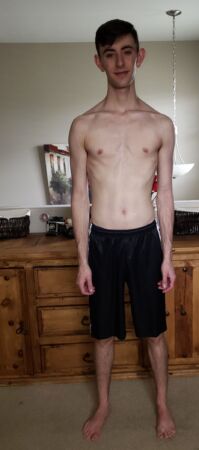
When I came home for the summer, the trauma from the debilitating anxiety attacks came with me. My mom was crying when I walked through the door with my packed bags, just glad to see that her son had made it back home after knowing what I was going through. The first few days back home, it was difficult to get the strength to do much of anything. I hoped that because I had nothing to worry about anymore and didn’t have to think about even looking at a textbook for three months, my anxiety would wash away. I was wrong.
One day after struggling to get out of bed, I took a long, hard look in the mirror. My gangly 6-foot-1-inch frame was barely being held together by essentially 110 lbs. of skin. I looked sick. My face was extremely pale, my cheeks were sunken in and my eyes were puffy from the lack of sleep. I could count each of my ribs as they protruded out of my chest. I felt frail and broken. Desperate for change, I stumbled down the stairs and asked for help.
Just as anxiety can take many different forms, methods for getting help can vary. I was lucky enough to have health and wellness professionals living in the same home as me. My mom and stepdad each have decades of experience in personal training, nutritional guidance and behavior change coaching. The day I asked for help, we began a complete physical and mental health transformation.
My health transformation began by developing a personalized exercise and nutrition plan. My stepdad and I created a schedule that put me on track to change my life. Pushing me to challenge myself, we would often work out together. I lifted with him three times a week and mixed in light cardio exercises. At first, the workouts were difficult and I was sore as hell, but I was put in a routine that centered my mind and put me on track. For my diet, we focused on nutritionally dense foods, such as dried fruit, vegetables, grains and lean meat, as well as supplementation from protein powders and pre-workouts.
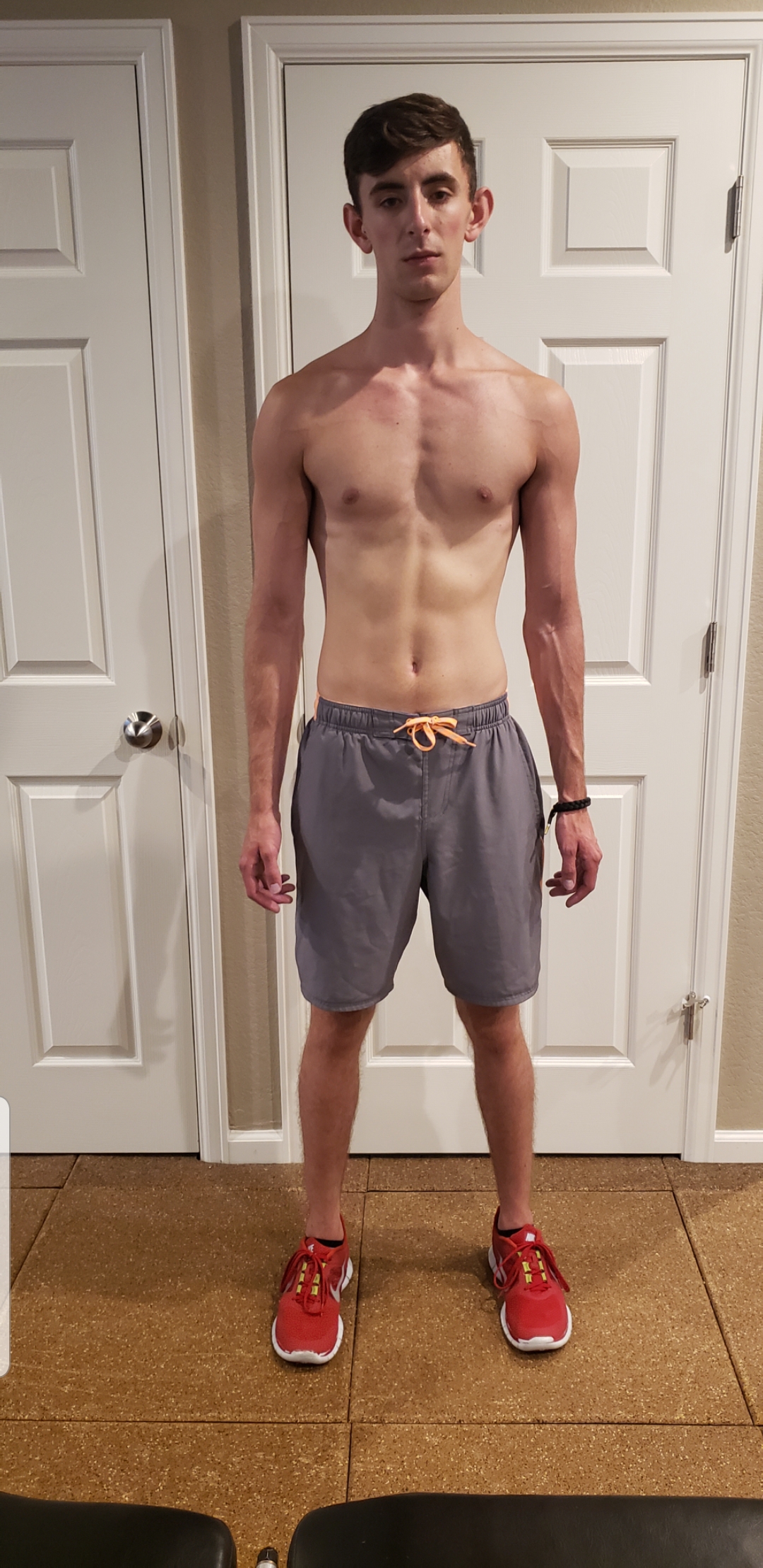
Over that summer, I became hooked on bettering myself mentally and physically. After just a couple of weeks, my head began to clear. Week by week, my numbers went up on the scale and in the weight room. I also started to generally feel more energized from clean eating. Replacing something that was damaging with something that was healthy was crucial in helping me stay sober and cope with anxiety. I was all-in when it came to bettering myself and worked hard each day. It wasn’t easy, but it paid off. By the last week of the summer, I stepped on the scale at 140 lbs., the heaviest I had ever been in my life. I felt strong, physically and mentally.
I was nervous to go back to school, away from the support I had received during the previous three months. It was inevitable that I would be surrounded again by my old vices and the temptation that comes with that. But I knew this was the last step to truly test myself and see how far I had come from that destructive state. I had to hold myself accountable and be adaptable.
Although we were separated, my stepdad’s support continued in the fall semester. He set me up with an online training app where he could remotely input new workouts for me. I continued exercising at either the CU Recreation Center, The Village Center or my apartment’s gym. I also planned out my meals each day to keep my nutrition on track. On top of eating right and exercising, I worked harder than ever in the classroom. It was always in the back of my mind what happened the previous semester and how I let the work catch up to me. This time, I pinned up a calendar on my bedroom wall and diligently wrote down everything that needed to be done for all of my classes. Rather than partying on the weekends, I spent my time producing work that I was really proud of. By getting ahead, I was able to be stress-free during the following week and not worry about missing an assignment. My grades started to reflect the dedication I was putting in, and by the end of spring semester of my sophomore year, I made it to the Dean’s List with a 3.9 GPA.
Today, I am happier and healthier than ever before. By asking for help, creating a support system and a routine, remaining dedicated to my goals and being adaptable, I have remained sober and learned to cope with my anxiety. Whether you deal with anxiety now or in the future, you’re not alone in this process, and I recommend you take the first step of asking for help when you are ready. It is so worth it.
For students dealing with stress, anxiety and depression, one resource is the SilverCloud Online Mental Health Program. SilverCloud Health is an online program at CU that offers online programs related to stress, depression and anxiety to help students better understand their emotional well-being. It is available for free to all CU Boulder students, grad students, staff and faculty. You can find more information here.
If you have concerns related to academics, anxiety, body image, depression, relationships, substance abuse, etc., you can contact Counseling and Psychiatric Services (CAPS). CAPS offers confidential, on-campus mental health and psychiatric services for students living in Colorado, including virtual telehealth workshops that cover a range of topics including coping with COVID-19.
While in-person appointments are not currently available, CAPS is available for virtual appointments through telehealth from 9 a.m. to 4 p.m., Monday through Friday. You can schedule an appointment through your patient portal at mycuhealth.colorado.edu and can find more information on signing up here. You can also contact CAPS 24/7 by phone: 303-492-2277.
If you are not sure if therapy is the right option for you or you are currently living in another state, you can sign up for e-Let’s Talk, a free telehealth service available to CU Boulder students who would like a confidential consultation with a counselor. These counselors can offer insight, solutions and information on additional resources for students who are experiencing stress, sadness, worry, financial struggles, issues concerning relationships or academic performance, etc.
If interested, fill out this form during their service hours: 10-11 a.m. and 3-4 p.m. during the weekdays. It is a first-come, first-serve basis. After filling out the form, a CAPS counselor will email you the link to a video session when it is your turn.
For those in recovery or seeking recovery from substance use and other addictions, the CU Collegiate Recovery Center (CUCRC) offers support to students, staff and alumni, including free support meetings and one-on-one recovery coaching. You can find more information on their website or contact them at 303-492-9642 or cucrc@colorado.edu.
Student Support and Case Management (SSCM) offers support to students by helping identify issues and the appropriate resource, creating an action plan the student can use. SSCM works to connect students to campus partners, community resources and support systems to help navigate challenging situations. You can find more information here or contact them via phone (303-492-7348) or via email (sscm@colorado.edu).
If COVID-19 caused you to relapse, you are not alone
By: Claire Purnell
Listen to Claire Purnell narrate her story
In March 2019, I published a piece titled “From Suicidal to Spiritual” as if that was it. As if I would never go back to that dark place. I was 18 years old, and I had so much happiness ahead of me in the very near future. However, I could not have imagined the heart-wrenching pain that would follow a little over a year later that would bring me right back to that dark place I thought I’d never feel again.
Exactly one year later, I was having the absolute time of my life as a freshman at The University of Colorado Boulder, and I was already dreading the end of the year when we would have to go home for summer. I could not wait for all the things the remainder of my freshman year had left in store. Then COVID-19 hit, and it all abruptly ended.
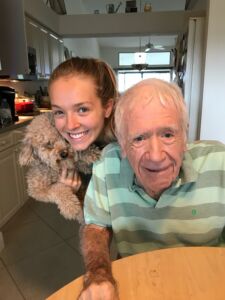
We frantically packed up our dorm rooms in fear of this deadly disease that no one seemed to know anything about. I flew to my grandparent’s house in Florida, where my brother already had arrived for an “extended spring break” and where my parents would soon meet us two days later. Just before my parents got there, I lost my grandpa to complications from his long fight with Parkinson’s disease. I am very lucky to have never lost a family member until this year; however, in March, I experienced more loss than I had in the previous 19 years of my life.
Prior to the pandemic, the lowest point of my life was in 2018. I was a competitive ice dancer, living in Michigan for training purposes and I was miserable. I could no longer keep up the strenuous training while eating so little in order to remain “skinny enough.” I could not handle the pressure and disappointment that came with each competition. None of those things were worth it any more when I had lost my love for the sport. I decided I could not continue in the sport in September of that year, but had to continue this life until the end of our season in January. During that time, I dragged myself through months of darkness in which every day felt like a burden. I wished I could just start my new life as a college student, but sometimes I questioned if I would ever even get there since it meant pushing through the misery I existed in. When I finally did, it was all worth it — until it was taken away from me and I found myself even more sad than I ever had ever been.
I could not go three hours without having a panic attack; and this is me being modest. My chest constantly felt tight, and I felt like I wouldn’t be able to breathe again until the pandemic was over and life was back to normal. I couldn’t look at pictures from the previous year or talk to my friends because it hurt. I couldn’t go on Instagram or Twitter because knowing the whole world was suffering only made me want to get out of it.
One night, I sat by the pool at my grandma’s house and I told myself, If things get worse or this lasts too long, I won’t stick around anymore. There is no way I can live like this for longer than a couple weeks. I thought of ways I would take myself out of this world as I sat by the pool and stared into the darkness. It crushed me to know I went from being so happy to contemplating suicide once again in only a month.
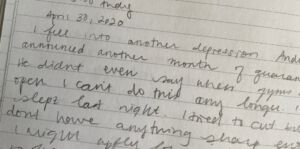
I read several things on social media that warned of suicide levels increasing due to this pandemic, such as this article by the Mayo Clinic. Loneliness, fear of the unknown, anxiety, loss of control, etc— these feelings were happening for everyone, and for those with mental health struggles, they can be even more elevated and cause a downward spiral quickly.
One morning, I watched the news with my mom as they talked about the mental toll of the pandemic in relation to the rising rates of suicide to come. I looked at her and basically said “See!” with my eyes, as if my severe depression was being justified and she could not blame me for wanting to die.
The next month I went back to therapy via phone. It was not the same, but I started having less panic attacks, kind of. I went through the same routine every day: wake up, drink celery juice, drink coffee and journal, workout, do zoom classes, got hit with the heaviness of the world again, read every news article about COVID-19 numbers, vaccines, updates in search of any sign of hope, have a panic attack (or five), cut myself or lie in bed and sob, eat dinner, cry and panic, watch Tik Tok and go to sleep. I broke my longest clean streak from self-harm this spring. If you had talked to me just three months beforehand, I would have told you that this would be the summer that I would go off my depression medicine because I felt I didn’t need it anymore. Things changed fast.
April went by slowly and May drew on and on as dates of reopening kept getting pushed back. I kept getting sadder and lonelier, but I stopped caring as much. I had less panic attacks because I replaced them with just feeling numb or hopeless. I still had some, but it would be more like random slaps of extreme sadness that I usually attempted to cope with by cutting myself. My therapist told me about a treatment center and strongly encouraged me to admit myself, telling me, “Your parents would rather pay for this than your funeral.” I still could not accept that I had gotten this sad after the best year of my life. Why did this have to happen to me? I will never deserve happiness.
In June, things opened a little bit. I had Cyclebar, my favorite workout class, to go to every day, which gave me something to exist for again. I started coaching skating and found a new routine for myself. I was able to see a couple friends and live a tiny bit more normally. I felt some of my happiness come back. I was nowhere near as happy as I was in Boulder, but some good feelings started coming back into my life. I still had pandemic panic attacks and a few rough moments with depression and self harm, but better moments were showing up more often. I became even more grateful for all the positive moments I experienced and I did not take a single one for granted.
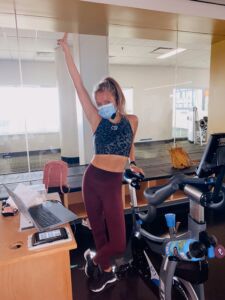
The rest of my summer at home continued to be much better than the first few months in quarantine. I stayed busy with work and a lot of working out. I was still recovering from the past few months, but I was learning to find the good in situations even if things were nothing like I would ever have asked for. I saw a new doctor, who doubled my medication. Initially, I felt ashamed about needing more help, but it really made a big difference. Although I had hoped to get off medication, COVID-19 has caused a lot of people to increase medication or even return to taking medication to cope with the loss and grief that has come along during this time. I still have to keep telling myself that I do not have to be embarrassed for getting help. Soon, I stopped fearing what was to come and started trusting that I would make the best of it, whatever it looked like.
It’s now Sept 8, 2020. September is National Suicide Awareness Month. I am lying in bed in my apartment in Boulder. It’s 12:00 a.m. and I am submitting my application to write for a local editorial. The editorial asked me to send over one of my published pieces as part of my application. I thought of the first one I had published, “From Suicidal to Spiritual,” and I felt like a liar. I wrote that piece like I had beat depression and suicidal thoughts, but I hadn’t. I still agree with much of what I wrote, but I would be lying if I told you I beat it all that easily. Beating this isn’t an easy thing to do. If the pandemic triggered mental health struggles you thought you had “gotten over,” you are not alone and you have no reason to feel any shame or guilt for relapsing or “going backwards” in your recovery.
Suicide isn’t a small topic to brush off or joke about. Suicide cannot be cured from a couple of books on spirituality, as much as books did help me at that time in my life. Being someone who struggles with suicidal thoughts is not being dramatic. Going through life with a constant voice in your head telling you that you should not exist anymore is insanely scary and no one should have to go through it alone. Too many innocent, wonderful, important people take their lives every year, because our society is too uncomfortable to openly have a conversation about suicide, its warning signs or how to get help. If you struggle with wanting to end your life, I beg you to tell someone who loves you or who you trust. Do not worry about it being “too much” or “too heavy,” because you know what would be too much? Losing you. No one wants that, even if it seems like it is your only solution. It isn’t. It never will be.
If you know someone who struggles with suicidal thoughts or self-harm, check on them. You don’t need to pry or do anything huge. You can simply send them a song that reminds you of them. You can send them a positive quote. You can ask them if they need anything. You can text them, “Hi I miss you”, and you will be a hero. Reaching out saves lives. Just because you cannot see it and the person may not make it obvious does not mean it is not real.
I hope this time I can be confident in my message that I have overcome self-harm and dealing with suicidal thoughts for the final time. A large part of me very much believes that to be the case. I think these past six months have shaped me into the strongest version of myself possible. I have overwhelming gratitude for every good moment. I have been able to make the best of my time back at school so far, even though for a long time I dreaded coming back to a “pandemic-ified” college so much that it made me sick.
In the spin classes that I teach, I repeat all the time what has become my mantra lately: “Life is not always going to be good, but if you want to feel happy then you can find something good in every day.” I still believe in the universe and all of the things that got me out of my low point in 2018, but I think that mantra is what has saved me this time around— that belief and all my friends who make me feel like I am needed in this world. I bet none of them know they are heroes, but they are. Reach out, pay attention and be aware that suicide is a prevalent issue especially in this time of a global pandemic, and you too will most definitely be a hero.
Anxiety disorders are the most common mental illness in the U.S., affecting 18.1% of the population, according to the Anxiety and Depression Association of America (ADAA). ADAA also reports that nearly 50% of “those diagnosed with depression are also diagnosed with an anxiety disorder.” More than 264 million people are affected by depression, a common illness that can lead to suicide, which is the second leading cause of death in 15-29-year-olds, according to the World Health Organization. Depression and anxiety can lead to self-harm, the act of intentionally causing injuries to one’s body, often as a method of releasing suppressed emotions.
- Feeling nervous, restless or a sense of impending doom
- Breathing rapidly, sweating, increased heart rate, trembling (often associated with a panic attack)
- Having gastrointestinal problems
- Often worrying about something and having trouble concentrating on other things
Source: Mayo Clinic
- Feelings of sadness, emptiness or hopelessness
- Loss of interest in activities such as their hobbies
- Anxiety, agitation or restlessness
- Feelings of worthlessness or guilt
- Thoughts of death, suicidal thoughts/attempts
- Loss of appetite
Source: Mayo Clinic
- Scars; fresh cuts, burns scratches or bruises
- Wearing long sleeves or long pants regardless of warm temperatures
- Expressing feelings of hopelessness, helplessness or worthlessness
- Behavioral impulsiveness or unpredictability
Source: Crisis Text Line
- Withdrawing from others, isolating oneself
- Talking about suicide or death/dying/violence
- Increasing use of alcohol or drugs
- Doing risky or self-destructive behavior
- Having mood swings, developing personality changes
- Giving away belongings or saying goodbye as if it is permanent
- Getting the means to take one’s life
- No longer taking care of themselves or doing activities they normally like
- You can contact the 24/7 support line of Counseling and Psychiatric Services (CAPS) at 303-492-2277.
- Colorado Crisis Services (CCS) offers a 24/7 support line for anyone experiencing a mental health, substance-related or emotional crisis. You can call CCS at 1-844-493-TALK or you can text “TALK” to 38255. You will be connected to a mental health professional who can provide immediate support and further information on additional resources.
- There is a 24/7 walk-in center, the Mental Health Partners Walk-In Center, in Boulder that offers confidential support to anyone in need. The address is: 3180 Airport Road, Boulder CO.
- The National Suicide Prevention Lifeline offers 24/7, free and confidential support for people in crisis. You can contact them at: 1-800-273-TALK (8255).
- If you are in a crisis, you can use the Crisis Text Line by texting “HOME” to 741741. You will be put into contact with a live, trained crisis counselor to help assist you.
- You can contact crisis counselors for a variety of reasons, whether it be depression, anxiety, COVID-19 related, emotional abuse, school related, suicide, etc.
- Counseling and Psychiatric Services (CAPS) offers students resources through counseling, the e-Let’s Talk program, therapy groups, virtual workshops, the SilverCloud online program and other services. You can contact CAPS through their 24/7 support line at 303-492-2277 or sign up for a telehealth appointment at mycuhealth.colorado.edu.
- The Office of Victim’s Assistance (OVA) offers advocacy, counseling and consultation and support to CU Boulder affiliates who have experienced a traumatic or life disruptive event. You can contact OVA at 303-492-8855 or via email at assist@colorado.edu.
- The Office of Institutional Equity and Compliance (OIEC) implements and enforces policies related to discrimination and harassment; sexual misconduct, intimate partner violence and stalking; and conflict of interest in cases of amorous relationships. Reports to the OIEC are not confidential; mandatory reporters are required to report to OIEC.
- OIEC can offer assistance with counseling, medical or legal services as well as modifications to campus activities
- If you have a report to file, you can anonymously report online or you can contact OIEC by phone (303-492-2127) or email (cureport@colorado.edu)
- You can find additional mental health professionals in and around the Boulder area here: https://colorado.thrivingcampus.com/
Room 313
By: Nicholas Kohler
Listen to Nicholas Kohler narrate his story
The sharp white lines manicure the field in dashes. On two ends the contrasting reds dress the end zone. The fall Sun setting over the last row of still empty seats in the stadium. Streaks of orange, red and gold ornament the blue sky that will soon fade into black, peppered with man-made stars. It’s the championship. This game means everything.
At least that is what he thinks as he walks back to his dorm room from dinner. He scampers up the stairs, two at a time. His anticipation for the game builds. As he speeds down the hallway, his thoughts jump from the game to his friends who will soon arrive in his room. Do I have enough beer? Do I have enough seating? Will I have to move the desks from the wall for more space? Who else will be in the room when I get back?
He arrives at his door and the number greets him: 313. He quickly pulls out his BuffOne card from his wallet, scans it, twists the now unlocked handle and bounds into the room ready for the game.
He is met with red. All over. The kitchen to the right of the entryway is covered. Red on the white fridge. Red on the wood paneled flooring. Red on the unwashed dishes in the sink. Red on the cabinets. Red on the walls.
What he does see is his roommate, smiling apologetically, sitting on the kitchen floor. He hears words but they do not register, as he is already moving to the living room. The futon with a split down the middle from one too many mid-day naps welcomes him as he flops down on to it. More red. On the desk. On the beer stained rug.
He reaches for the remote, but it eludes him. He probes his roommate about its location. He is met with a grunt, so, unsatisfied, he pulls himself up from the couch to ask again. He glides past the hallway that leads to the bedrooms and bathroom. More red streaks meet him; they appear along the white walls as if to see which of them can make it farthest.
The words leave his mouth before he rounds the corner of the living room into the kitchen. He tells his roommate that people will soon be over and that he will need to clean up. Not a problem. He faces his roommate who remains on the floor and finally sees. Broken glass. Hands on wrists. Red covering his roommate’s arms. Slowly dripping onto the floor.
His mind races, remembering all the images he so casually played off. Hand prints. Smears. Drops. Drags. He stops. No, he can’t move. What he sees is so foreign, so unnerving to him that he freezes, his eyes absorbing the red. Then, he twists the handle and leaves.
Writer's Note
This story is based on a real-life experience. I shared this story because I hope it shows my failure in being prepared to help someone. While I did go back to the scene and contacted my RA’s for help, I also left someone who had committed self-harm alone. I saw the signs, and I did not know how to properly deal with them. The paramedics, contacted by the RA’s, got to the roommate in time; afterwards, the roommate sought professional help. Hopefully, this story will inspire others to learn how to take the necessary steps if they, too, see the signs. Hopefully, this story inspires others to be there for one another.
- Developing personality changes or having mood swings. This may include demonstrating severe anxiety or agitation.
- Isolating and disassociating from others.
- Stopped doing things they love or stopped taking care of themselves.
- Expresses feeling trapped, hopeless or feeling as though they are a burden.
- Talking about wanting to die or suicide.
- Increased use of alcohol or drugs, as well as self-destructive activity.
- Giving away their personal items or belongings, or saying goodbye as if they won’t be seen again.
Sources: Counseling and Psychiatric Services, CU Boulder and Mayo Clinic
- Ask the Question refers to asking someone “Have you had thoughts about suicide?” when you are concerned about their wellbeing. While this may feel uncomfortable, research has shown that asking the question does not increase a person’s likelihood of thinking about suicide; rather, it is a method of starting the conversation with someone you may be concerned about and getting them the help they need.
- Ask the Question is part of the #BeThe1To campaign that aims to raise awareness about suicide and suicide prevention.
- If you are concerned about a friend but are not sure how to help, you can contact Counseling and Psychiatric Services (CAPS) at 303-492-2277. If the person you are concerned about has experienced a traumatic or life disrupting event, you can contact the Office of Victim Assistance (OVA) at 303-492-8855 or email assist@colorado.edu.
- Welfare checks: If you believe someone is in a crisis, you can request a welfare check from a police department.
- For on-campus welfare checks, you can contact CU Police Department (CUPD) at 303-492-6666.
- For off-campus welfare checks, you can contact Boulder Police at 303-441-3333.
- Call 911 if you are in danger or believe someone is in a potentially life-threatening situation.
- If you are in immediate danger or are worried about someone, call 911 or go to your nearest emergency room.
- The Office of Victim Assistance (OVA) offers free and confidential support, advocacy, short-term counseling and consultation to CU Boulder students, faculty and staff who have experienced “a traumatic, disturbing or life disruptive event.” If you have questions about OVA or would like to meet with an OVA Advocate Counselor, you can call 303-492-8855 or email assist@colorado.edu. You can also submit a confidential report to OVA through this form.
- To speak to a mental health professional outside of business hours, CU students, faculty and staff can call 303-492-8855 and press “2.”
- OVA offers services to those who have experienced harassment, discrimination, hazing, death, stalking, physical assault and other traumatic or disruptive events; if you are unsure if OVA can help you, call or email them.
- For those who have experienced secondary trauma, meaning that they work with or have been exposed to other’s traumatic situations, OVA offers free and confidential advocacy and counseling services.
Unplugged from Reality
By: Nic Tamayo
Listen to Nic Tamayo narrate his story
At the beginning of this pandemic, I was excited. No school, endless Netflix originals and opportunities to nap at every corner. As time passed, though, I began to feel anxious. Each day moved slower than the last; each day filled with non-stop news coverage and thousands of deaths from disease, natural disasters and violence.
In April, COVID-19 cases in the U.S. dramatically increased. In May, I broke public health protocol. I said f*** it, got into my car and drove to my best friend’s house. No mask, no social distancing, no precautions. I risked mine and others’ health because I just wanted to feel something different. In June, Black Lives Matter protests swept the nation. In July, the spread of COVID-19 began to spike again. In August, I finally made it to Boulder. Each passing month brought on a new life-altering event that shook me to my very core. My emotions went crazy. I was anxious, inspired, depressed, excited and lonely all at the same time. Nothing felt real.
Since I’ve been in Boulder, I’ve had the opportunity to add peers on Snapchat, watch people eat cereal during Zoom classes and do most of my work alone in my room. Forming any kind of connection with these people is difficult; they’re just animated characters on a screen to me. There’s something about the 2D image of a person on my laptop screen that just feels hollow– fake.
Originally, I was intending to write about loneliness during the pandemic; however, after conducting interviews and upon personal reflection, I realized that I’m not lonely. Instead, I feel disconnected. While social media and Zoom satisfy my need for social interaction, the conversations I’m having, the people I’m meeting, the things I’m learning, they don’t feel authentic.
Jaeda Rodriguez, a freshman studying communication and a self-proclaimed extrovert, says she has felt the same.
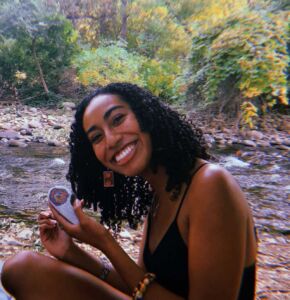
“I feel like that whole Zoom fatigue thing is so real. Like, I just get tired of it and I, like, don’t want to talk to people on Zoom,” says Rodriguez. For her, the interactions just aren’t the same, describing that “…having conversations over Zoom is just so much [more] different; you can’t really feed off of each other as much.”
Rodriguez and I first met through the Multicultural Leadership Scholars program at CU Boulder. I’d seen her face on Zoom and, while we shared a lot of the same interests, we hadn’t had a chance to meet in-person until this interview. As we began talking, the scheduled 15-20 minute interview soon turned into an hour-long discussion. We spoke about our similar experiences during the pandemic and the ways that social media allows us to engage in current events, namely the Black Lives Matter movement.
Rodriguez describes how she connected with, and distanced herself from, people based on their social media interactions in response to the Black Lives Matter movement.
“I mean. it definitely made me feel less connected to some people,” says Rodriguez. “If you didn’t say anything, I was like, okay, no comment but… I went to protests… and I felt like I was having so many, like, meaningful conversations and people were actually wanting to learn.”
She continues, “… at the height of, like, that whole, the whole Black Lives Matter movement that happened this summer, that was probably when I felt the most connected during the quarantine. Just because, like, so many people were talking to me.”
While social media offered a way for individuals like myself and Rodriguez to connect with others when discussing racial issues, it has been difficult to form genuine connections with others through Zoom.
The need for connection is something that impacts all people, even introverts like Sara Jamieson, a professor of cultural anthropology and gender studies for the College of Media, Communication and Information (CMCI) who enjoys her time in solitude. However, there’s a fine line between solitude and isolation.
“Have you ever been in a place where your loneliness takes you to a dark place, and you’re like, ‘Ooh, couple more days in here and it wouldn’t be pretty’?” asks Jamieson. “That’s when you do need other people… to pull you out.”
Similar to myself, Jamieson reached the point where she felt the need to leave her house and have an in-person interaction with friends.

“Honestly, being in my house, at some point, it felt like ‘I need an escape’… so I remember finding my one friend in Denver who felt comfortable with me coming down, and I’d just be like, ‘I need to come spend the night. I need to get away,’” says Jamieson.
Much like my interview with Rodriguez, my 20-minute interview with Jamieson turned into a two-hour-long conversation. She is one of the few faculty members that I’ve gotten a chance to have in-depth conversations with, as she is the only professor that I get to see in-person every week.
Jamieson contracted COVID-19 in March and has since developed a high level of antibodies to the virus. These antibodies have given her the confidence to teach all of her classes in-person this semester, yet she will teach remotely for two weeks until the Boulder County public health order ends.
“I do feel lucky ‘cause I do still get to be in person, but I am anxious because I’m waiting. I’m wondering if any day I’m going to hear, ‘it’s all virtual,’” says Jamieson.
On Monday, Sept. 21, Chancellor Philip P. DiStefano announced that all undergraduate, graduate and law classes will be taught remotely for a minimum of two weeks beginning on Sept. 23, during the student self-quarantine period. Three days later on Thursday, DiStefano and Boulder County Public Health announced an additional public health order, requiring all local residents between the age of 18 and 22 to avoid gatherings of any size. If not, consequences may occur.
The shift to remote learning increases the dependence on Zoom for communication and connection, and it’s something that impacts faculty members and students alike. A decline in mental health, a separation from the world around us, a breaking point, these are all things that connect Rodriguez, Jamieson and me.
There are more than 6,000 CU freshmen living on campus. We imagined making friends at orientation, joining new clubs and having classes with hundreds of other students. Yet, we still haven’t figured out how to talk constructively through Zoom. I’m not lonely; I’ve become disconnected to the environment that we all find ourselves in. One thing that I do know for sure, though, is that we have to try our best and keep going. It’s all we can do at this point.
Active Minds, CU Student Organization: If you are interested in connecting with other students who are passionate about mental health advocacy, Active Minds CU Boulder is a student organization that focuses on increasing mental health awareness and education. The organization had their first meeting on Tuesday, Sept. 22 and spoke about the impact COVID-19 on their mental health and the ways they can support one another and the people in their lives. To find out more information about Active Minds and their upcoming meetings, you can follow their Instagram (@activemindscuboulder).
Dealing with homesickness
By: Piper Vaughn
Listen to Piper Vaughn narrate her story
Going into my freshman year at CU last fall, I was literally counting down the days. Coming from a small town about an hour and a half away from campus, I was so ready to leave home and be on my own. Even though none of my friends from high school were going to Boulder, I am a sociable person and figured that I would make friends quickly regardless of the circumstance. I felt more than prepared for this new journey. But little did I know, I was way over my head.
When I got to Boulder and finally had to say goodbye to my family, it all hit me. I was alone, knew barely anyone on this campus of over 33,000 students and had to prepare for classes. The homesickness really started to settle in about a month or so into the fall semester. I would call each member of my family every second I could. Yes, college is fun– don’t get me wrong– but being away from home and my comfort zone was really hard for me to get used to. I remember being upset that I hadn’t met my “best friends” yet, and this really frustrated me as I was so used to having my friend group from home with me. Feeling alone made everything seem worse, and eventually started to affect who I wanted to become in college.
I remember wanting to go home so bad, often thinking about it and even looking at old photos and videos on my phone in an attempt to make myself feel better. However, seeing these memories made me long for home even more. To make matters worse, I realized I didn’t like the major I had chosen, making school quite difficult. My once thriving social life felt like it was, for the first time, in the dirt. I was miserable, to say the least.
However, by the time October came around, things finally started to change for me. I rushed in the fall, joined a sorority and met girls who were becoming my closest confidants and my best friends. I joined the Volunteer Club, switched my major, was more passionate about my school work and became more involved in my sorority. By getting involved, branching out and, most importantly, doing things that I enjoyed is what really helped me connect with Boulder and mostly get over my homesickness.
While change can be scary when you don’t know anyone and are away from the life you were so used to, the more you put yourself out there, the more people you will meet. It was challenging at first, but it made me stronger. Being vulnerable and getting out of my comfort zone is what made my freshman year so great. It is hard, scary and so different from the high school experience. But in a year, once you look back, just as I am today, I believe it will all be worth it.
Peer Wellness Coaching (PWC): PWC is a CU Boulder program that aims to help students achieve their wellness goals. This may include getting help with managing stress, time, relationships, academic goals, physical health or making changes to your life. It is a free service that you can sign up for by filling out this form, calling 303-492-2937 or sending an email to PeerWellnessCoaching@colorado.edu.
Magazine Contributors
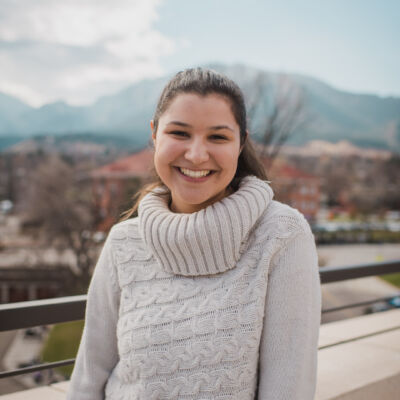
Tayler Shaw is a senior majoring in journalism and Spanish for the professions and minoring in anthropology and leadership studies. She is from Littleton, Colorado. Her interests include explanatory and solutions journalism on topics ranging from education, culture and community-based issues.
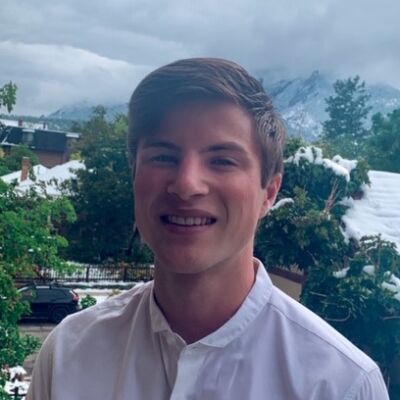
Nicholas Kohler is a senior majoring in journalism with minors in sports media, art history and business. His interests include sports, reading, movies and socializing. He is a member of the fraternity Pi Kappa Alpha. He also is the journalism chair of the Senior Class Council.

Claire Purnell is a sophomore journalism major at CU Boulder. She is from Louisville, Kentucky. She ended her ice dancing career in 2019 to follow her dreams of being a writer and to experience a normal college life. Claire is now a spin instructor, Diversity co-chair of her sorority (Alpha Phi) and she loves all things health, happiness and fitness.
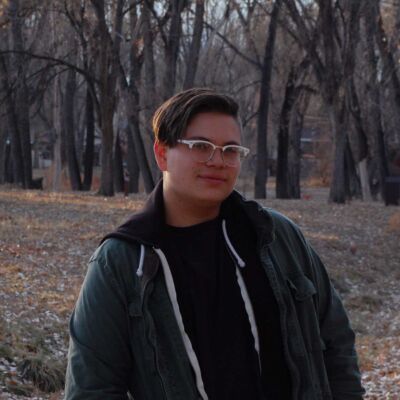
Nic Tamayo is a freshman studying journalism at CU. Originally from Colorado Springs, he’s an avid baker, a lover of literature and a (former) barista.
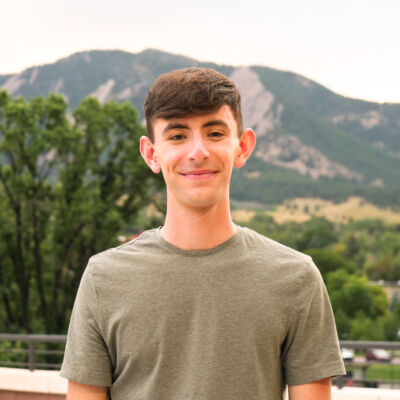
Nathan Bowersox is a junior pursuing a major in advertising, a minor in business and a writing certificate. He is originally from Castle Rock, Colorado and enjoys playing golf, volleyball and collecting sneakers in his free time. He is also the marketing manager at The Bold.
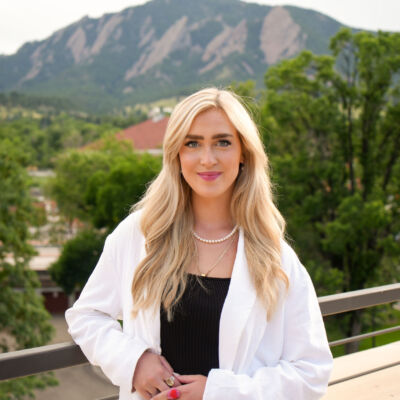
Piper Vaughn is from Castle Rock, Colorado, and is a senior majoring in journalism with a minor in english. Vaughn is the Arts and Entertainment editor and will also be taking on The Bold’s new video section! She enjoys her dog, spending time with friends and family and loves to run. Piper has been involved in several organizations including The Bold, CMCI Honors Program, NewsTeam Boulder, Alpha Phi, and was a fellow for News21 in Phoenix, Arizona.

